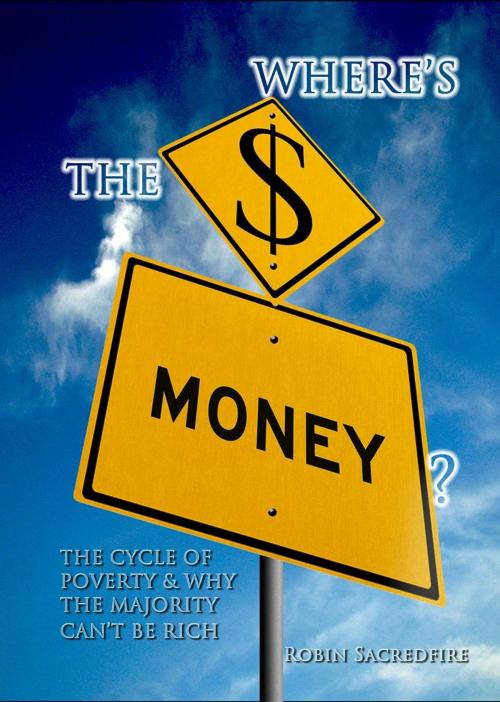Where’s the Money? The Cycle of Poverty and Why the Majority Can’t Be Rich
Nonfiction, Reference & Language, Education & Teaching, Administration, Business & Finance, Finance & Investing, Finance, Health & Well Being, Self Help, Self Improvement, Success| Author: | Robin Sacredfire | ISBN: | 9781507021026 |
| Publisher: | 22 Lions Bookstore | Publication: | February 14, 2015 |
| Imprint: | Language: | English |
| Author: | Robin Sacredfire |
| ISBN: | 9781507021026 |
| Publisher: | 22 Lions Bookstore |
| Publication: | February 14, 2015 |
| Imprint: | |
| Language: | English |
Traveling to very poor countries allows noticing that the majority of the locals tend to look at foreigners as a walking ATM machine that guarantees their monthly income and food in the table on a daily basis.
On the opposite spectrum of this constant need, we have those that have fallen in love with money and went bankrupt, having their pride and anger reversed against their nature.
Many Europeans and North Americans, whose self-image is based on pride, either regarding their nation, job or reputation, don’t just suffer now from lack of money, but also depression and lack of purposes in life.
They’ve rooted themselves in the lowest spiritual spectrum and, when money’s gone, become empty vessels.
A truly spiritual individual, on the other hand, won’t focus on material outcomes but rather emotional.
That’s the difference between those traveling now to South America for a better lifestyle and the ones looking for their next fortune in China.
It’s interesting as well to notice that usually the poor don’t use internet to gain information on how to create a business or acquire knowledge that can improve their lifestyle, even though they often have email accounts.
Undervaluing information seems to be the common attitude of the poor, while emigration serves different purposes, depending on the primordial mindset.
Within the current interexchange of human resources throughout the world, we can notice that the poor see only one source of income and that’s tourism, so they focus on gaining money on the only way they know, and that’s by copying what they see.
As a conclusion we could say that knowledge opens the horizons to those that can see beyond, but such evidence would be far from enough.
While the cultural background affects the attitude of the poor class around the world, we also observe that there’s a certain dependency in both the low and middle class towards the higher class.
For the low class, working means things like giving you a ride in their motorcycle, selling you junk acquired very cheaply from China or taking you for a ride in a chariot with a starving horse.
For the middle class, it means something else, based on what they believe – getting a job that pays well.
Both the low and middle class live within the same paradigm, which derives from an obsolete world that they learned to accept as real and unique.
As this world changes, these two classes become poorer and more similar, because they can’t analyze reality from different perspectives.
We have not only a disappearing middle class and an increasingly low class, but also a tendency for both to become poorer.
Despair is, at this point, merely a reflection of the effects of delusional behaviors in an economy that will persist in changing, leaving the current industrial patterns behind.
This book shows why this happens and where the money is for those willing to get it in the coming new world order.
Traveling to very poor countries allows noticing that the majority of the locals tend to look at foreigners as a walking ATM machine that guarantees their monthly income and food in the table on a daily basis.
On the opposite spectrum of this constant need, we have those that have fallen in love with money and went bankrupt, having their pride and anger reversed against their nature.
Many Europeans and North Americans, whose self-image is based on pride, either regarding their nation, job or reputation, don’t just suffer now from lack of money, but also depression and lack of purposes in life.
They’ve rooted themselves in the lowest spiritual spectrum and, when money’s gone, become empty vessels.
A truly spiritual individual, on the other hand, won’t focus on material outcomes but rather emotional.
That’s the difference between those traveling now to South America for a better lifestyle and the ones looking for their next fortune in China.
It’s interesting as well to notice that usually the poor don’t use internet to gain information on how to create a business or acquire knowledge that can improve their lifestyle, even though they often have email accounts.
Undervaluing information seems to be the common attitude of the poor, while emigration serves different purposes, depending on the primordial mindset.
Within the current interexchange of human resources throughout the world, we can notice that the poor see only one source of income and that’s tourism, so they focus on gaining money on the only way they know, and that’s by copying what they see.
As a conclusion we could say that knowledge opens the horizons to those that can see beyond, but such evidence would be far from enough.
While the cultural background affects the attitude of the poor class around the world, we also observe that there’s a certain dependency in both the low and middle class towards the higher class.
For the low class, working means things like giving you a ride in their motorcycle, selling you junk acquired very cheaply from China or taking you for a ride in a chariot with a starving horse.
For the middle class, it means something else, based on what they believe – getting a job that pays well.
Both the low and middle class live within the same paradigm, which derives from an obsolete world that they learned to accept as real and unique.
As this world changes, these two classes become poorer and more similar, because they can’t analyze reality from different perspectives.
We have not only a disappearing middle class and an increasingly low class, but also a tendency for both to become poorer.
Despair is, at this point, merely a reflection of the effects of delusional behaviors in an economy that will persist in changing, leaving the current industrial patterns behind.
This book shows why this happens and where the money is for those willing to get it in the coming new world order.















